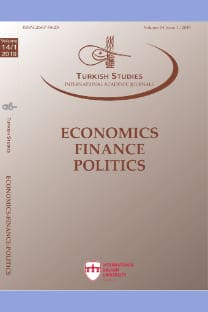ESTIMATING THE EFFECT OF MUNICIPAL ENVIRONMENTAL INDICATORS ON LIFE SATISFACTION: EVIDENCE FROM TURKEY*
YAŞAM MEMNUNİYETİ ÜZERİNDE BELEDİYELERİN ÇEVRE GÖSTERGELERİNİN ETKİSİNİN TAHMİN EDİLMESİ: TÜRKİYE’DEN KANITLAR
___
Ambrey, C. (2014). Essays on the Influence of the Environment on Life Satisfaction: Evidence from Australia. Queensland: Griffith University.Cramer, J. S. (2003). Logit Models From Economics and Other Fields. New York: Cambridge University Press.
Diener, E., Ronald, I., & Tay, L. (2013). Theory and Validity of Life Satisfaction Scales. Social Indicators Research, 112(3), 497-527.
Diener, E., Suh, E. M., Lucas, R. E., & Smith, H. L. (1999). Subjective Well-Being: Three Decades of Progress. Psychological Bulletin, 125(2), 276-302.
European Commission. (2017, November). Standart Eurobarometer 88. May 5, 2019 tarihinde Public opinion in the European Union: https://ec.europa.eu/commfrontoffice/publicopinion/index.cfm/ResultDoc/downloa d/DocumentKy/81142 adresinden alındı Eurostat. (2017, August). Water statistics. Statistics Explained: https://ec.europa.eu/eurostat/statistics-explained/pdfscache/1182.pdf adresinden alındı
Frey, B. S., Luechinger, S., & Stutzer, A. (2009). The Life Satisfaction Approach to Environmental Valuation. Bonn: Institute for the Study of Labor.
Giovanis, E. (2014). Relationship between well-being and recycling rates: evidence from life satisfaction approach in Britain. Journal of Environmental Economics and Policy, 3(2), 201-214.
Helliwell, J., Layard, R., & Sachs, J. (2012). World Happiness Report. New York: UN Sustainable Development Solutions Network. https://s3.amazonaws.com/happinessreport/2012/World_Happiness_Report_2012.pdf adresinden alındı
Luechinger, S. (2009, March). Valuing Air Quality Using The Life Satisfaction Approach. The Economic Journal(119), 482-515.
MacKerron, G., & Mourato, S. (2009). Life satisfaction and air quality in London. Ecological Economics(63), 1441-1453. doi:10.1016/j.ecolecon.2008.10.004
OECD. (2019a). OECD Environmental Performance Reviews: Turkey 2019. Paris: OECD Publishing. doi:https://doi.org/10.1787/9789264309753-en
OECD. (2019b). Environment. June 3, 2019 tarihinde OECD Better Life Index: http://www.oecdbetterlifeindex.org/topics/environment/ adresinden alındı
OECD. (2019c). Indicator. doi:10.1787/5a287eac-en Praag, B. M., & Baarsma, B. E. (2005). Using happiness surveys to value intengibles: The case of airport noise. The Economic Journal(115), 224-246.
Ryan, R. M., Huta, V., & Deci, E. L. (2008). Living well: a self-determination theory perspective on eudaimonia. Journal of Happiness Studies, 9(1), 139-170. doi:10.1007/s10902-006-9023-4
Schmitt, M. T., Aknin, L. B., Axsen, J., & Shwom, R. L. (2018). Unpacking the Relationships Between Pro-environmental Behavior, Life Satisfaction, and Perceived Ecological Threat. Ecological Economics(143), 130-140.
Smyth, R., Mishra, V., & Qian, X. (2008). The Environment and Well-Being in Urban China. Ecological Economics, 68(1-2), 547-555. doi:10.1016/j.ecolecon.2008.05.017
TurkStat. (2014). Source of happiness, 2003-2014. May 5, 2019 tarihinde Life Satisfaction Survey: http://www.turkstat.gov.tr/HbPrint.do?id=18629 adresinden alındı
TurkStat. (2016, January 22). Well-Being Index for Provinces, 2015. May 10, 2019 tarihinde Press Release: http://www.turkstat.gov.tr/PreHaberBultenleri.do?id=24561 adresinden alındı
Welsch, H. (2009). Implications of happiness research for environmental economics. Ecological Economics(68), 2735-2742. doi:10.1016/j.ecolecon.2009.06.003
Welsch, H., & Kühling, J. (2009). Using Happiness Data for Environmental Valuation: Issues and Applications. Journal of Economic Surveys, 23(2), 385-406.
Welsch, H., & Kühling, J. (2010). Pro-environmental behavior and rational consumer choice: Evidence from surveys of life satisfaction. Journal of Economic Psychology(31), 405-420.
Xiao, J. J., & Li, H. (2011). Sustainable Consumption and Life Satisfaction. Social Indicators Research, 104(2), 323-329. doi:10.1007/s11205-010-9746-9
- ISSN: 2667-5625
- Yayın Aralığı: 4
- Başlangıç: 2006
- Yayıncı: ASOS Eğitim Bilişim Danışmanlık Otomasyon Yayıncılık Reklam Sanayi ve Ticaret LTD ŞTİ
Ali KESTANE, Niyazi KURNAZ, Mert osman SİZER
KUŞADASI EKOTURİZM POTANSİYELİNİN DEĞERLENDİRİLMESİ
KAMU KURUMLARI YÖNETİMİNDE LİDERLİK VE KRİZ YÖNETİMİ
TÜRKİYE’DEKİ HAVALİMANLARININ ETKİNLİKLERİNİN VERİ ZARFLAMA ANALİZİ İLE DEĞERLENDİRİLMESİ
OTEL YATIRIMLARINDA KURULUŞ YERİ SEÇİMİ VE AGLOMERASYON KOŞULLARININ ETKİSİ
